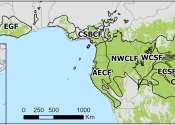Cyclone bears down on flood-hit Kenya, Tanzania
Beaches were deserted and many shops closed on Saturday as heavy rains and winds from a tropical cyclone buffeted coastal areas of Tanzania and Kenya.

Beaches were deserted and many shops closed on Saturday as heavy rains and winds from a tropical cyclone buffeted coastal areas of Tanzania and Kenya.
Environment
May 5, 2024
0
7

Hadeda ibises (Bostrychia hagedash) are one of the most familiar species of birds across sub-Saharan Africa. They are large, long-legged birds with long, thin beaks for probing invertebrates out of soil, and though they appear ...
Plants & Animals
May 3, 2024
0
11

Kenya and Tanzania were on alert on Saturday for a cyclone heading towards their Indian Ocean coastlines, threatening to pile on more misery after deadly floods that have ravaged the region.
Environment
May 3, 2024
0
8

The death toll from flood-related incidents in Kenya has crossed 200 since March, the interior ministry said Friday, as a cyclone barrelled towards the Tanzanian coast.
Environment
May 3, 2024
0
7

A new study presents the first large-scale analysis of fire patterns in West and Central Africa's wet, tropical forests. The number of active fires there typically doubled over 18 years, particularly in the Congo Basin. The ...
Earth Sciences
May 2, 2024
0
35

In less than eight years, white sharks in South Africa have all but disappeared from their historical hotspots in False Bay and Gansbaai, on the Western Cape coast. These areas were once known as the "white shark capital ...
Plants & Animals
May 2, 2024
0
1

Kenya and Tanzania were bracing Thursday for a cyclone on the heels of torrential rains that have devastated East Africa, killing more than 350 people and forcing tens of thousands from their homes.
Environment
May 2, 2024
0
8

The number of people who have lost their lives in devastating floods in Kenya since March has risen to 188, with dozens still missing, the interior ministry said on Thursday.
Environment
May 2, 2024
0
10

The conflict in Sudan has turned attention to a rarely discussed commodity: gum arabic. This product, the dried sap of certain species of acacia trees, is used mainly as an additive in the soft drinks industry. Sudan accounts ...
Plants & Animals
Apr 30, 2024
0
7

It has long been thought that meat played an important role in the diet of hunter-gatherers before the Neolithic transition. However, due to the scarcity of well-preserved human remains from Paleolithic sites, little information ...
Archaeology
Apr 29, 2024
0
66
Africa is the world's second-largest and second most-populous continent, after Asia. At about 30.2 million km² (11.7 million sq mi) including adjacent islands, it covers 6% of the Earth's total surface area and 20.4% of the total land area. With a billion people (as of 2009, see table) in 61 territories, it accounts for about 14.8% of the World's human population. The continent is surrounded by the Mediterranean Sea to the north, the Suez Canal and the Red Sea to the northeast, the Indian Ocean to the southeast, and the Atlantic Ocean to the west. Not counting the disputed territory of Western Sahara, there are 53 countries, including Madagascar and various island groups, associated with the continent.
Africa, particularly central eastern Africa, is widely regarded within the scientific community to be the origin of humans and the Hominidae tree (great apes), as evidenced by the discovery of the earliest hominids and their ancestors, as well as later ones that have been dated to around seven million years ago – including Sahelanthropus tchadensis, Australopithecus africanus, A. afarensis, Homo erectus, H. habilis and H. ergaster – with the earliest Homo sapiens (human) found in Ethiopia being dated to ca. 200,000 years ago.
Africa straddles the equator and encompasses numerous climate areas; it is the only continent to stretch from the northern temperate to southern temperate zones.
This text uses material from Wikipedia, licensed under CC BY-SA